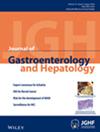Benefits of TIPS for Patients With Large Ascites Preceding Recurrent or Refractory ascites: A Multicenter Cohort Study
Abstract
Background and Aim
Patients with recurrent or refractory ascites can benefit from transjugular intrahepatic portosystemic shunt (TIPS). However, the value of TIPS for patients with large ascites remains unclear.
Methods
This retrospective multicenter study included patients who underwent TIPS or medicine plus large-volume paracentesis (medicine + LVP) for ascites between January 2014 and December 2022 at five centers. The primary endpoint was recurrence or worsening of ascites. The secondary endpoints were liver-related death, all-cause hemorrhage, overt hepatic encephalopathy (OHE), and shunt dysfunction.
Results
Overall, 724 patients were evaluated, including 373 patients with large ascites preceding recurrent or refractory ascites received TIPS (the LA-TIPS group), 282 patients with recurrent and refractory ascites received TIPS (the RA-TIPS group), and 69 patients with large ascites preceding recurrent or refractory ascites received medicine + LVP (the LA-M group). Patients in the LA-TIPS group had significantly lower incidences of recurrence or worsening of ascites (37.4% vs. 45.3%, p < 0.001), liver-related death (44.8% vs. 62.0%, p < 0.001), and OHE (47.3% vs. 60.3%, p < 0.001) than those in the RA-TIPS group. Meanwhile, patients in the LA-TIPS group had significantly lower incidences of recurrence or worsening of ascites (37.4% vs. 44.6%, p = 0.006) and hemorrhage (38.3% vs. 47.2%, p = 0.042), but a higher incidence of OHE (34.2% vs. 4.5%, p < 0.001) than those in the LA-M group.
Conclusions
In terms of controlling ascites, the benefit of TIPS was greater in patients with large ascites preceding recurrent or refractory ascites, suggesting that TIPS might be considered in patients with large ascites before they progress to recurrent or refractory stages.

 求助内容:
求助内容: 应助结果提醒方式:
应助结果提醒方式:


